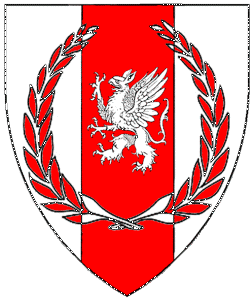For the most part, SCA etiquette is very similar to everyday politeness. Say please and thank you, ask before sitting down next to someone, don’t touch other people’s things, wait patiently in line…it’s all just as applicable at a feast as it is in the food court. We have our own rules and guidelines for etiquette as well, but we were all new once, and no-one’s going to begrudge a few well-meant mistakes. This is a guide to the basics, but if in doubt, just copy the people around you, and you can’t go too far wrong.
Titles
There are a wide range of titles we use, generally associated with particular awards. Over time you’ll get to know what they all mean, but the most important things to know are:
- ‘Milord/milady’ are equivalent to modern ‘sir/ma’am’, and are always a polite way to address someone
- Anyone wearing a crown or coronet is probably important, and calling them ‘your Excellency’ is probably correct
- ‘Master/Mistress/Sir/Dame So-and-so’ indicates someone highly respected (called a ‘peer‘), and you should probably continue to use that title when speaking to or about them. It’s used like Mr/Ms – always as part of the name
Special Clothes
We use special clothing or accessories to indicate holders of particular titles or positions. There are a lot of different ways we do this, but the most important ones to know are:
- Crowns: The fanciest crowns are worn by the king and queen. Barons, baronesses, counts, countesses, dukes, and duchesses all wear coronets (with varying degrees and styles of decoration). People without a title can wear a plain metal circlet if they choose
- Belts: A white belt is ONLY worn by knights. Traditionally, red, green, and yellow belts are used to indicate the students of a peer, but they aren’t restricted
- Jewellery: An unornamented chain necklace is worn by peers and ceremonial leaders to indicate that they have sworn loyalty to the Crown. It’s not restricted, per se, but it’s advised not to wear one unless you’ve done so. Various awards come with tokens or medallions, but you aren’t expected to recognise them
The King and Queen
Our King and Queen are the most important of our Very Important People. If you’re at the same event as them, you should:
- Bow or curtsey when you pass near them or their thrones, or they pass by you
- Address them as ‘your Majesty’
- Otherwise treat them as important (e.g. let them go first, wait for them to acknowledge you before starting a conversation, avoid passing in front of them if they’re watching something, etc)

